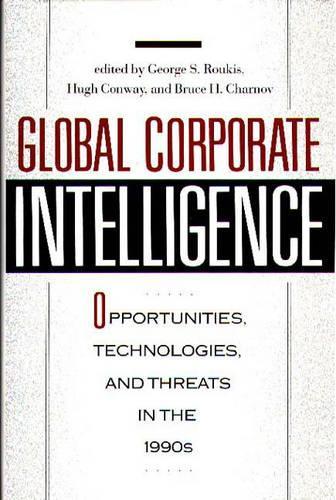
Global Corporate Intelligence: Opportunities, Technologies, and Threats in the 1990s
(Hardback)
Publishing Details
Global Corporate Intelligence: Opportunities, Technologies, and Threats in the 1990s
By (Author) Bruce H. Charnov
By (author) Hugh Conway
By (author) George Roukis
Bloomsbury Publishing PLC
Praeger Publishers Inc
8th May 1990
United States
Classifications
Tertiary Education
Non Fiction
Artificial intelligence (AI)
658.47
Physical Properties
Hardback
360
Description
In this volume, noted experts in a variety of information, business, and management fields offer a comprehensive overview of the role information plays in global business and its impact on competion and competitiveness. At the core of the collection is a common belief in the essential value of information to the modern business and a recognition that the corporate intelligence function must today cope with changing realities produced by both new technology and the globalization of markets. Taking these as their points of departure, the contributors discuss a broad spectrum of corporate intelligence issues ranging from the uses of artificial intelligence and the structure of the corporate intelligence system to the nature of security threats, financial warfare, and corporate risk assessment. The chapters are divided into five sections and begin with two essays on the emerging interrelated global world order. George Roukis discusses the corporate intelligence process as it embodies the global view, while Hugh Conway shows how modern technology has changed the corporate intelligence function. Three chapters explore the information applications of new technologies, including the use of the computer to further all aspects of corporate intelligence gathering and the emergence of an information industry to serve the needs of intelligence gatherers. The following section contains chapters that address, in turn, the use of intelligence in strategic decisionmaking, coping with bad news, the process of intelligence gathering, and field-marketing intelligence. Turning to a discussion of outside threats to corporate intelligence data security, the contributors examine computer security in general, defense related computer security, and the terrorist threat to corporations. In the final section, the contributors look at the number of strategic challenges. A particularly interesting chapter examines corporate intelligence in Japan; others look at geography and corporate risk assessment, the Soviet foreign intelligence service, and corporate responses to financial warfare.
Reviews
Global Corporate Intelligence goes beyond computer crimes to make managers aware of other threats to their firms. George Roukis maintains that trade-secret thefts cost firms billions of dollars annually and these costs will increase as computers become easier to penetrate. He also contends that 'industrial espionage will assume greater importance than military or political espionage in future years, and this threat must be forthrightly addressed by concerned corporate management. An effective all-embracing corporate intelligence system is crucial for survival.' While Global Corporate Intelligence is filled with important ideas and recommendations, it often reads like a textbook. However, readers who struggle through will be rewarded with an insight into all aspects of effective global corporate intelligence.-Flying Dutchman International
"Global Corporate Intelligence goes beyond computer crimes to make managers aware of other threats to their firms. George Roukis maintains that trade-secret thefts cost firms billions of dollars annually and these costs will increase as computers become easier to penetrate. He also contends that 'industrial espionage will assume greater importance than military or political espionage in future years, and this threat must be forthrightly addressed by concerned corporate management. An effective all-embracing corporate intelligence system is crucial for survival.' While Global Corporate Intelligence is filled with important ideas and recommendations, it often reads like a textbook. However, readers who struggle through will be rewarded with an insight into all aspects of effective global corporate intelligence."-Flying Dutchman International
Author Bio
GEORGE S. ROUKIS is Professor of Management and Industrial Relations at Hofstra University and a professional labor arbitrator. He formerly served as United Stated Deputy Assistant Secretary of Labor (1973-1975) and chaired an emergency board for the President of the United States in the railroad industry in 1986. He has coedited Managing Terrorism: Strategies for the Corporate Executive (Quorum, 1983). HUGH CONWAY is the Director of Regulatory Analysis, Occupational Safety, and Health Administration, U.S Department of Labor in Washington, D.C. He recently edited a text, Defense Economic Issues for the National Defense University, Washington, D.C. BRUCE H. CHARNOV is Assistant Professor of Management and General Business at Hofstra University where he teaches courses in strategic business planning. He is the coauthor of Management (1987) and Ethical Dilemmas of the Academic Profession (1987). CONTRIBUTORS: George S. Roukis, Hugh Conway, Robert F. Gordon, Mahesh Chandra and Shivaji Rao, Paul G. Zurkowski, David M. Flynn, John E. Ullmann, Mamdouh Farid, Hanry S. Berszinn, Bruce Charnov, Robert S. Redmond, Joseph E. Goldberg, Robert J. Kuhne, Akira Tomioka, Ewan W. Anderson, Joshua N. Feinman, Peter M. Garber, Michelle R. Garfinkel, Marshall Lee Miller.
